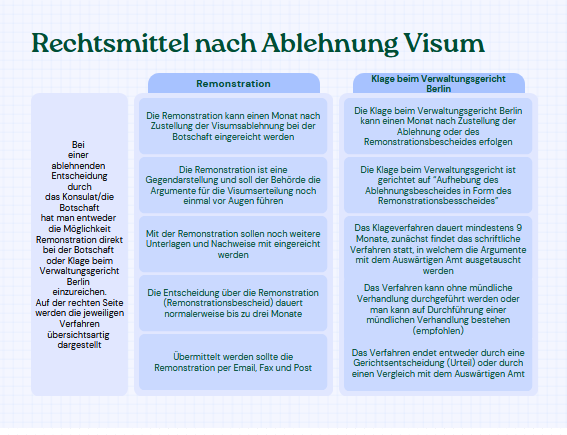Administrative Court of Berlin, 15.03.2012, Ref.: 35 K 468.10 V
According to Section 6, Paragraph 1 of the Residence Act (AufenthG), a foreigner may be granted a visa for transit through the territory of the Schengen States or for planned stays in this territory of up to 90 days per 180-day period, or an airport transit visa for transit through the international transit zones of airports, in accordance with Regulation (EC) No. 810/2009.
However, the purpose and circumstances of the intended stay must be proven by the third-country national, and there must be no threat to public order. A risk to public order is deemed to exist, among other things, if there is a possibility that the applicant will not leave the territory of the member state after the visa is granted and before it expires.
Therefore, when reviewing the application, it must be assessed whether there is a risk of illegal immigration. This issue is addressed in the following ruling by the Administrative Court of Stuttgart, which also establishes that the date indicated in the visa application is not a fixed criterion, and the plaintiff’s claim does not automatically become moot upon the expiration of the specified date. Instead, the plaintiff seeks to compel the issuance of a visa in general. Furthermore, the court concludes that a request for the issuance of a territorially restricted visa is included as a „lesser option“ within an application for a Schengen visa. If the conditions for issuing a uniform visa are not met, it must still be considered whether the issuance of a visa with restricted territorial validity is possible.

Schengen Visa Denied Due to Lack of Willingness to Return
The plaintiff, a Pakistani citizen, sought the issuance of a Schengen visa to visit his father and younger brother, who live in Germany. The plaintiff is unmarried, childless, and has been working in the administration of a private company in Pakistan since 2009. He had a regular income and owned two fixed deposit accounts. His father, who has been living in Germany for several years and holds German citizenship, had committed to covering the costs of the plaintiff’s living expenses and departure.
In June 2010, the plaintiff applied for a Schengen visa for a visit period of one month. However, this application was denied because the German embassy in Islamabad expressed doubts about the plaintiff’s willingness to return. The subsequent remonstration process was also unsuccessful. The plaintiff then filed a lawsuit with the Administrative Court of Berlin.
Plaintiff’s Argument and Application – Plaintiff Claims Strong Ties to Home Country
The plaintiff argued that he had no intention of staying in Germany permanently and cited his family and economic ties in Pakistan as evidence of his willingness to return. He requested that the rejection notices be overturned and that the requested visa be granted.
The defendant (Federal Republic of Germany) requested that the lawsuit be dismissed. It referred to the reasons already cited in the remonstration decision and emphasized the existing doubts about the plaintiff’s willingness to return, particularly in light of his family situation.
Legal Assessment by the Court
The Administrative Court of Berlin found the lawsuit to be admissible but unfounded. The court determined that the plaintiff had no entitlement to the issuance of a Schengen visa. The legal basis for the decision was Section 6 of the Residence Act in conjunction with Regulation (EC) No. 810/2009 (Visa Code). The plaintiff did not meet the requirements for visa issuance due to doubts about his willingness to return.
Doubts About Willingness to Return
The court based its decision on specific indications that cast doubt on the plaintiff’s willingness to return. Although the plaintiff was economically rooted in Pakistan, there was insufficient familial attachment. In particular, the plaintiff’s immediate family—his father and younger brother—already lived in Germany. The ongoing efforts of his mother to also join them in Germany were seen as further evidence of the plaintiff’s lack of willingness to return.
Consideration of Fundamental Rights
The court noted that the protection of marriage and family under Article 6 of the Basic Law (GG), Article 8 of the European Convention on Human Rights (ECHR), and Article 7 of the Charter of Fundamental Rights of the European Union did not play a decisive role in this case. These fundamental rights could be considered in decisions regarding visa issuance, but only in the context of a visa with restricted territorial validity. Since the conditions for such a visa were also not met, the rejection of the application was lawful.
Proportionality and Reasonableness
The court emphasized that the denial of the visa was not disproportionate. The plaintiff was not necessarily dependent on visiting Germany to maintain family contact. The father and brother could just as easily visit him in Pakistan, or maintain contact through other means of communication. These alternatives were deemed reasonable for the family, given the ages of the plaintiff and his younger brother.
Conclusion
In summary, the Administrative Court of Berlin ruled that the lawsuit was unfounded and that the plaintiff had no entitlement to a Schengen visa. The doubts about his willingness to return, as well as the sufficient alternatives for maintaining family contact, justified the rejection of his visa application.
Source: Administrative Court of Berlin
Important Note: The content of this article has been prepared to the best of our knowledge and belief. However, due to the complexity and constant evolution of the subject matter, we must exclude liability and warranty. Important Notice: The content of this article has been created to the best of our knowledge and understanding. However, due to the complexity and constant changes in the subject matter, we must exclude any liability and warranty.
If you need legal advice, please feel free to call us at 0221 - 80187670 or send us an email to info@mth-partner.de
Lawyers in Cologne advise and represent clients nationwide in immigration law.


